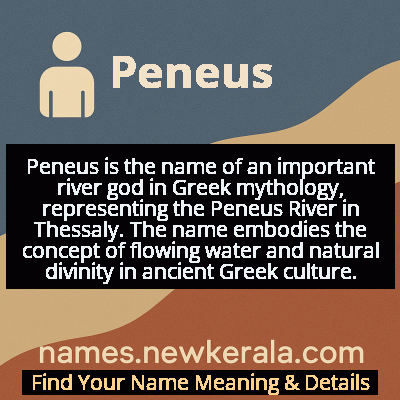Peneus Name Meaning & Details
Origin, Popularity, Numerology Analysis & Name Meaning of Peneus
Discover the origin, meaning, and cultural significance of the name PENEUS. Delve into its historical roots and explore the lasting impact it has had on communities and traditions.
Name
Peneus
Gender
Male
Origin
Greek
Lucky Number
8
Meaning of the Name - Peneus
Peneus is the name of an important river god in Greek mythology, representing the Peneus River in Thessaly. The name embodies the concept of flowing water and natural divinity in ancient Greek culture.
Peneus - Complete Numerology Analysis
Your Numerology Number
Based on Pythagorean Numerology System
Ruling Planet
Saturn
Positive Nature
Ambitious, efficient, realistic, and authoritative.
Negative Traits
Materialistic, stressed, confrontational, and can be overly ambitious.
Lucky Colours
Dark blue, black.
Lucky Days
Saturday.
Lucky Stones
Blue sapphire, amethyst.
Harmony Numbers
2, 4, 6.
Best Suited Professions
Business leaders, managers, financial services, law enforcement.
What People Like About You
Leadership, determination, organizational skills.
Famous People Named Peneus
Peneus (Mythological)
River God
Divine personification of the Peneus River, father of Daphne and Cyrene
Peneus (Historical Reference)
Geographical Feature
Major river in Thessaly mentioned by Homer, Herodotus, and other ancient writers
Peneus (Literary)
Mythological Character
Featured in Ovid's Metamorphoses as the father of Daphne pursued by Apollo
Name Variations & International Equivalents
Click on blue names to explore their detailed meanings. Gray names with will be available soon.
Cultural & Historical Significance
The name Peneus connects deeply with Greek cultural identity, representing the intersection of landscape, mythology, and daily life in ancient times. River gods like Peneus were considered protectors of their regions, with local cults and worship practices. His presence in multiple literary works, from Homer's Iliad to Ovid's Metamorphoses, demonstrates his enduring significance across Greek and Roman cultures. The river itself formed a natural boundary in Thessaly and played crucial roles in historical events, including Xerxes' invasion of Greece, where the Persian army famously drank it dry according to Herodotus.
Extended Personality Analysis
Individuals named Peneus are typically perceived as possessing a calm, steady nature reminiscent of a flowing river, with deep emotional currents running beneath a composed exterior. They often exhibit strong protective instincts, particularly toward family, mirroring the mythological Peneus's role as a caring father to Daphne. Their personality combines ancient wisdom with natural grace, showing resilience in facing challenges while maintaining a connection to tradition and heritage. These individuals tend to be deeply rooted in their principles yet adaptable to changing circumstances.
Peneus-named individuals often demonstrate a philosophical approach to life, valuing continuity and natural cycles. They possess an innate understanding of life's ebbs and flows, making them excellent mediators and stable presences in turbulent situations. Their strength lies in their persistence and ability to carve their path gradually but surely, much like a river shaping its course through landscape over centuries. While they may appear reserved initially, they reveal profound depth and emotional richness to those who earn their trust, embodying the mysterious depths of their mythological river counterpart.
Modern Usage & Popularity
In contemporary times, Peneus remains an exceptionally rare given name, primarily used by classical scholars, mythology enthusiasts, or parents seeking unique names with deep historical roots. Its usage is almost exclusively confined to Greece and academic circles, with virtually no presence in modern baby name statistics. The name occasionally appears in literary contexts or as a character name in works inspired by Greek mythology. While traditional Greek names have seen resurgent popularity, Peneus remains niche due to its strong mythological associations and perceived antiquity. Modern usage typically reflects a conscious choice to honor classical heritage rather than following naming trends.
Symbolic & Spiritual Meanings
Peneus symbolizes the eternal flow of life, representing both constancy and change through its river symbolism. As a mythological figure, it embodies the intersection of nature and divinity, suggesting a bridge between the mortal and immortal realms. The name carries connotations of nourishment and sustenance, reflecting the river's role in supporting civilization while also representing boundaries and natural barriers. Symbolically, Peneus suggests depth beneath calm surfaces, hidden strengths, and the power of gradual, persistent influence. It represents the idea that even the most powerful forces can appear tranquil while containing immense potential, much like a river that can both sustain life and reshape landscapes through its enduring flow.

